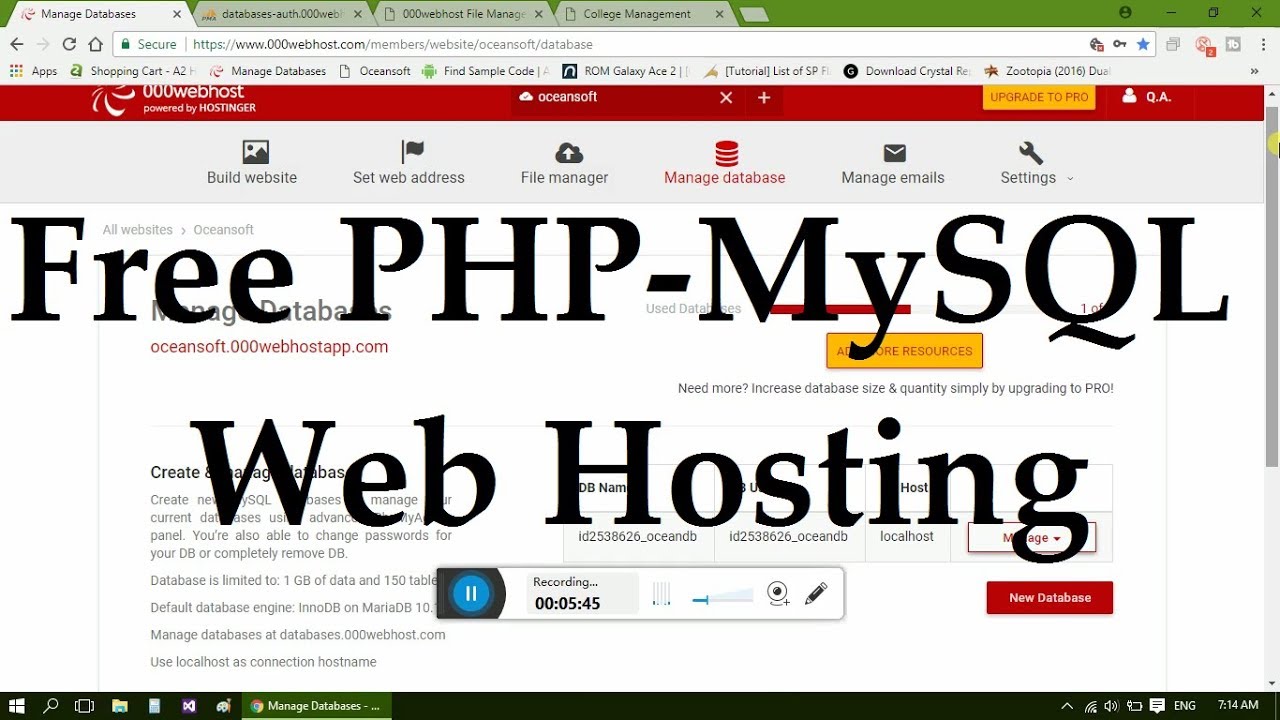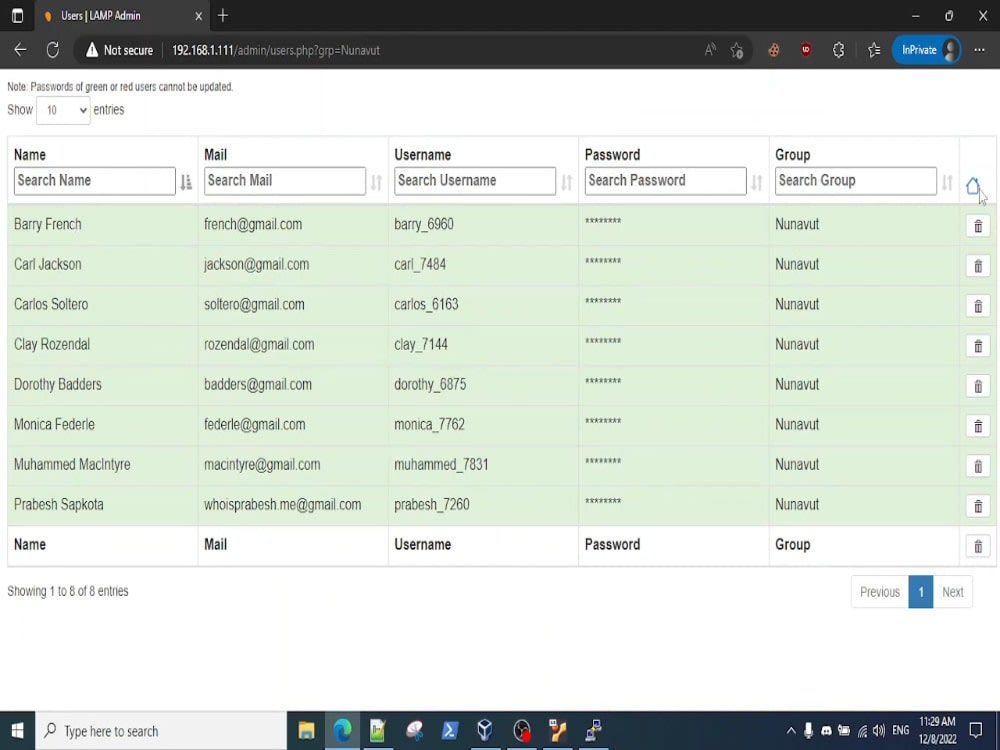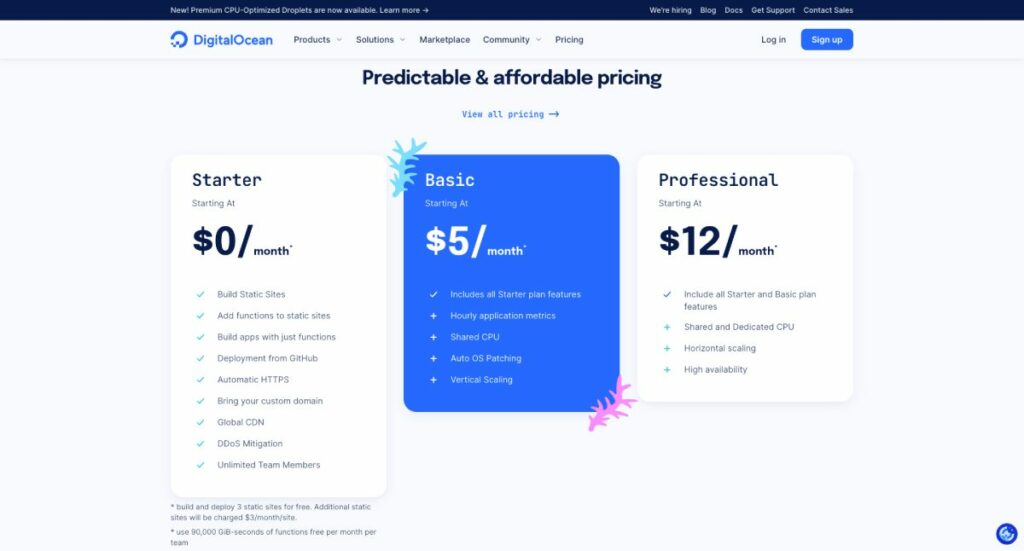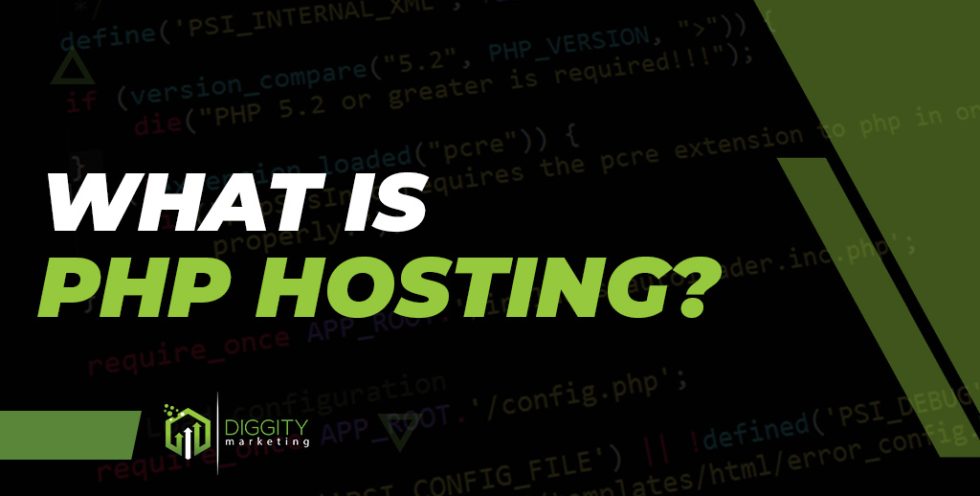Free PHP MySQL hosting sets the stage for web development enthusiasts and aspiring programmers, offering a gateway to the world of dynamic websites and database-driven applications. This cost-effective solution provides a platform to learn, experiment, and build projects without the initial financial commitment, making it an ideal starting point for those exploring the realm of web development.
Free hosting plans typically offer a range of features, including basic web space, database access, and support for popular scripting languages like PHP and MySQL. While these plans come with limitations in terms of resources, bandwidth, and storage, they serve as a valuable stepping stone for individuals and small businesses looking to establish an online presence or test their ideas before investing in more robust hosting solutions.
What is Free PHP MySQL Hosting?

Free PHP MySQL hosting is a type of web hosting service that allows you to host websites and applications built using PHP and MySQL, without paying any monthly fees. This type of hosting is typically offered by companies as a way to attract new customers or to provide a basic level of service for those who are just starting out.
Free PHP MySQL hosting is often a good option for beginners who are learning to develop websites or for small projects that do not require a lot of resources. However, it is important to be aware of the limitations of free hosting plans before choosing this option.
Features and Limitations of Free Hosting Plans
Free hosting plans typically offer a limited set of features and resources. Some common features of free hosting plans include:
- A limited amount of disk space
- A limited amount of bandwidth
- A limited number of email accounts
- Access to basic PHP and MySQL features
- Support for common website frameworks and CMS platforms
However, free hosting plans often have limitations that can impact the performance and functionality of your website or application. Some common limitations include:
- Slow loading times due to shared server resources
- Limited support for advanced features, such as SSL certificates or custom domains
- Restrictions on the types of applications or websites that can be hosted
- Potential for downtime due to server overload or maintenance
- Limited customer support options
Popular Free Hosting Providers
There are many free hosting providers available, each with its own set of features and limitations. Some popular free hosting providers include:
- 000Webhost
- FreeHostingNoAds
- InfinityFree
- ByetHost
- AwardSpace
It is important to carefully compare the features and limitations of different free hosting providers before choosing one. Consider your specific needs and requirements before making a decision.
Benefits of Free PHP MySQL Hosting
Free PHP MySQL hosting offers a compelling solution for developers and individuals seeking to build and deploy web applications without the initial cost barrier. This type of hosting provides a valuable starting point for projects of all sizes, from personal websites to more complex applications.
Cost Savings and Accessibility, Free php mysql hosting
Free PHP MySQL hosting eliminates the financial burden associated with traditional hosting plans, making it accessible to a wider audience. This affordability is particularly beneficial for beginners, students, and hobbyists who are exploring web development and want to experiment with their ideas without significant financial investment. It also allows developers to test their applications and prototypes in a real-world environment without incurring any upfront costs.
Learning and Experimentation
Free hosting platforms provide an excellent environment for learning and experimentation. They allow developers to familiarize themselves with the intricacies of PHP, MySQL, and web server configurations in a safe and controlled setting. By deploying their projects on free hosting, developers can gain valuable hands-on experience and observe how their code interacts with a live server environment. This practical experience is crucial for developing a strong understanding of web development principles and best practices.
Setting Up a Free PHP MySQL Hosting Account
Setting up a free PHP MySQL hosting account is a straightforward process that involves selecting a hosting provider, creating an account, and configuring your website. This guide will walk you through the steps, helping you get your PHP website up and running quickly.
Choosing a Free PHP MySQL Hosting Provider
Selecting a suitable free hosting provider is crucial for a smooth and efficient setup. Several free hosting services offer PHP and MySQL support, but it’s essential to consider factors such as performance, features, and reliability. Popular options include:
- 000webhost: Offers a free hosting plan with a generous amount of disk space, bandwidth, and MySQL databases.
- Freehostia: Provides free hosting with a choice of data centers and a user-friendly control panel.
- AwardSpace: Offers a free hosting plan with a limited amount of disk space and bandwidth but includes essential features for basic websites.
Creating a Free Hosting Account
Once you’ve chosen a provider, creating an account is usually a simple process. You’ll typically be asked to provide basic information such as your email address, username, and password.
- Visit the hosting provider’s website: Navigate to the provider’s website and locate the “Sign Up” or “Create Account” button.
- Fill out the registration form: Enter your personal information, including your email address, desired username, and a strong password.
- Verify your email address: Check your email inbox for a verification link and click on it to activate your account.
Creating a Database
After creating your hosting account, you’ll need to create a database to store your website’s data. Most free hosting providers offer a database management system (DBMS) like phpMyAdmin, which allows you to create, manage, and access databases.
- Access the database management system: Log in to your hosting account’s control panel and locate the database management section.
- Create a new database: Enter a unique name for your database and click on the “Create” button.
- Create a database user: Set up a user with appropriate permissions to access the database. You’ll need to provide a username and password.
- Grant database user permissions: Assign the user the necessary privileges to interact with the database, such as read, write, and delete permissions.
Configuring PHP Settings
Free hosting providers typically offer basic PHP configuration options, allowing you to adjust settings such as the maximum execution time and memory limit.
- Access the PHP configuration settings: Locate the PHP settings section in your hosting account’s control panel.
- Adjust PHP settings: Modify settings as needed, such as increasing the maximum execution time for scripts that require longer processing times.
- Save the changes: Confirm your changes and save them to apply the new PHP settings.
Uploading and Deploying Your PHP Website
After setting up your database and configuring PHP settings, you can upload your PHP website files to the hosting environment. You can use a file transfer protocol (FTP) client such as FileZilla or a web-based file manager provided by your hosting provider.
- Connect to your hosting server: Establish an FTP connection to your hosting server using your username, password, and the server address provided by your hosting provider.
- Upload your website files: Navigate to the directory where your PHP files are stored and transfer them to the root directory of your website on the server.
- Modify database connection settings: Update the database connection details in your PHP code to match the database name, username, and password you created earlier.
- Access your website: Open your web browser and enter the domain name or IP address of your website to view your deployed website.
Free PHP MySQL Hosting Limitations
While free PHP MySQL hosting offers a convenient and cost-effective way to get started with web development, it’s essential to be aware of the limitations that come with these plans. Free hosting providers often impose restrictions on resources, features, and performance to manage costs and server capacity. Understanding these limitations is crucial for making informed decisions about your hosting needs and choosing the right plan for your project.
Performance Considerations
Free hosting plans often come with shared server environments, where multiple websites share the same server resources. This shared environment can lead to performance issues, especially during peak traffic hours. When multiple websites compete for the same resources, your website may experience slower loading times, increased latency, and occasional downtime.
- Limited CPU and RAM: Free plans typically offer limited CPU and RAM resources, which can impact the speed and responsiveness of your website, especially if it experiences high traffic or resource-intensive tasks.
- Shared Resources: Sharing server resources with other websites can lead to performance fluctuations and slowdowns, especially during peak traffic periods.
Storage Constraints
Free hosting plans typically offer limited storage space, which can be a significant constraint for websites with large databases, media files, or numerous files.
- Limited Disk Space: Free plans often have strict limits on disk space, which can restrict the size of your website files, databases, and uploaded content.
- No Backup Options: Free plans may not offer regular backups, which means you might lose your data if your website encounters technical issues or security breaches.
Resource Limitations
Free hosting plans often impose limitations on various resources, such as bandwidth, email accounts, and database size.
- Bandwidth Restrictions: Free plans usually have limited bandwidth, which can affect the number of visitors your website can handle and potentially lead to slow loading times or even website outages if your website receives high traffic.
- Limited Email Accounts: Free plans often restrict the number of email accounts you can create, which can be a problem if you need multiple email addresses for your website or business.
- Database Size Limitations: Free plans may impose limits on the size of your MySQL database, which can restrict the amount of data you can store and manage.
Security Features
Free hosting plans often lack robust security features that are common in paid hosting plans.
- Limited Security Measures: Free plans may offer basic security features like firewalls and antivirus protection, but they may not have advanced security measures like intrusion detection systems or malware scanning.
- Increased Risk of Security Breaches: Sharing a server with multiple websites can increase the risk of security breaches, as a compromise on one website could potentially affect others.
Free Hosting for Specific Projects

Free PHP MySQL hosting can be a valuable resource for various types of projects, offering a cost-effective way to get started. However, it’s essential to understand the suitability of free hosting for different project types and the potential limitations that may arise.
Free Hosting for Personal Websites and Blogs
Free PHP MySQL hosting is an excellent option for personal websites and blogs. These platforms typically require minimal resources, making them ideal for free hosting plans. The benefits include:
- Cost-Effectiveness: Free hosting eliminates the initial investment in web hosting, allowing you to focus on building your website or blog content.
- Ease of Setup: Most free hosting providers offer user-friendly interfaces and automated setup processes, making it simple to get your website online quickly.
- Basic Functionality: Free plans provide the essential features for personal websites and blogs, including PHP support, MySQL databases, and email accounts.
Free Hosting for Small Business Applications
Free hosting can be a viable option for small business applications that have modest resource requirements. However, it’s important to carefully consider the limitations:
- Limited Storage and Bandwidth: Free plans often have restricted storage and bandwidth allowances, which may be insufficient for high-traffic applications or large file uploads.
- Performance Issues: Free hosting providers may share resources with other users, leading to slower performance, especially during peak hours.
- Lack of Support: Free hosting plans typically offer limited or no technical support, which can be challenging for businesses that require assistance with website maintenance or troubleshooting.
Free Hosting for Large-Scale Projects
Free hosting is generally not recommended for large-scale projects that require significant resources and robust infrastructure.
- Performance Limitations: Free hosting environments often struggle to handle the high traffic and data processing demands of large-scale applications, leading to slow loading times and poor user experiences.
- Security Concerns: Free hosting providers may have weaker security measures compared to paid hosting services, increasing the risk of data breaches and other security vulnerabilities.
- Scalability Issues: Free hosting plans typically lack the flexibility to scale resources as your project grows, potentially hindering its long-term growth and performance.
Alternatives to Free Hosting
Free hosting might seem like a good starting point, but it often comes with limitations. For more demanding projects or websites with growing traffic, paid hosting solutions offer better performance, reliability, and features. Here are some alternatives to free hosting:
Shared Hosting
Shared hosting is a cost-effective option where multiple websites share the same server resources. This means you’ll share processing power, memory, and disk space with other users.
- Cost: Shared hosting plans are typically the most affordable option, starting from a few dollars per month.
- Features: Shared hosting usually includes features like email accounts, databases, and website builder tools.
- Benefits: Shared hosting is a good choice for small websites with low traffic, as it’s budget-friendly and easy to set up.
- Limitations: Shared hosting can be slower than other options, and your website’s performance may be affected by other users on the same server.
VPS Hosting
VPS (Virtual Private Server) hosting provides a dedicated portion of a physical server, giving you more resources and control. It’s a step up from shared hosting, offering improved performance and security.
- Cost: VPS hosting is more expensive than shared hosting, but still relatively affordable, starting from around $10 per month.
- Features: VPS hosting offers more resources, including dedicated RAM, CPU, and disk space, as well as root access for greater control.
- Benefits: VPS hosting provides better performance and security than shared hosting, making it suitable for websites with moderate traffic and resource-intensive applications.
- Limitations: VPS hosting requires more technical knowledge to manage than shared hosting, and you may need to handle server maintenance tasks.
Cloud Hosting
Cloud hosting utilizes a network of servers to distribute your website’s resources. This offers high scalability, flexibility, and reliability.
- Cost: Cloud hosting is generally more expensive than shared or VPS hosting, but its cost is based on usage, making it scalable and flexible.
- Features: Cloud hosting provides a wide range of features, including automatic scaling, high availability, and advanced security measures.
- Benefits: Cloud hosting is ideal for websites with high traffic, demanding applications, and those requiring high availability and scalability.
- Limitations: Cloud hosting can be complex to manage, and costs can vary depending on usage and resources.
When to Choose Paid Hosting
Paid hosting options are more suitable when:
- Website Traffic: Your website experiences significant traffic or is expected to grow rapidly.
- Performance: You need faster loading times and better performance for your website or applications.
- Security: You require enhanced security measures to protect your website and data.
- Features: You need specific features not offered by free hosting, such as dedicated resources, root access, or advanced security tools.
- Reliability: You need a reliable hosting environment with minimal downtime.
Security Considerations with Free Hosting
While free PHP MySQL hosting offers a convenient and cost-effective solution for web development projects, it’s crucial to acknowledge the inherent security risks associated with this type of service. These risks can arise from factors such as shared resources, limited control over server configurations, and potential vulnerabilities in the hosting platform itself.
Understanding these risks and implementing appropriate security measures is essential to protect your website and data from malicious attacks.
Choosing Reputable Providers
Selecting a reputable free hosting provider is a fundamental step in mitigating security risks. Look for providers with a proven track record of security, reliable uptime, and a commitment to user privacy. Here are some key factors to consider:
- Security Features: Check if the provider offers features like SSL/TLS certificates, firewalls, and intrusion detection systems.
- User Reviews and Ratings: Explore online reviews and ratings from other users to gauge the provider’s reputation and customer satisfaction.
- Customer Support: Ensure the provider offers responsive and helpful customer support in case you encounter any security-related issues.
Implementing Security Measures
Once you’ve chosen a reputable provider, it’s crucial to implement security measures within your PHP application to further strengthen its defenses. This involves a combination of coding practices, security tools, and ongoing vigilance.
- Secure Coding Practices: Employ secure coding practices to prevent common vulnerabilities such as SQL injection, cross-site scripting (XSS), and cross-site request forgery (CSRF).
- Regular Updates: Keep your PHP version, database software, and all third-party libraries updated to patch known security vulnerabilities.
- Strong Passwords: Use strong and unique passwords for your website administration and database access.
- Two-Factor Authentication: Enable two-factor authentication for sensitive accounts to add an extra layer of security.
- Security Monitoring: Regularly monitor your website for suspicious activity and anomalies, and take immediate action if any security breaches are detected.
Security Practices Checklist
Here is a checklist of essential security practices for PHP applications hosted on free platforms:
- Input Validation and Sanitization: Always validate and sanitize user input to prevent injection attacks.
- Secure Session Management: Implement secure session management techniques to protect user data.
- Error Handling and Logging: Implement robust error handling and logging mechanisms to identify and troubleshoot security issues.
- Regular Backups: Regularly back up your website data and code to minimize the impact of security breaches.
- Firewall Configuration: Configure your firewall to block unwanted traffic and protect your website from malicious attacks.
- Vulnerability Scanning: Regularly scan your website for vulnerabilities using automated tools or manual checks.
- Security Awareness Training: Educate yourself and your team about common security threats and best practices to mitigate risks.
Last Recap
Free PHP MySQL hosting presents a compelling option for beginners and those seeking to explore web development without significant upfront costs. It provides a valuable learning environment, allowing individuals to gain practical experience and build foundational skills. While limitations exist, the benefits of accessibility, cost savings, and a platform for experimentation make free hosting a viable choice for a wide range of projects. As projects grow and demands increase, transitioning to paid hosting options becomes a natural progression, ensuring scalability and performance optimization.




